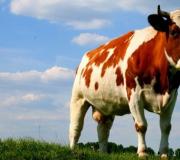Essays. The theme of the Great Patriotic War in the works of Tvardovsky and Sholokhov For some slow-witted readers, Tvardovsky will subsequently specifically hint at the deep difference that exists between the true hero and his namesake
A. T. Tvardovsky’s poem “Vasily Terkin” is an outstanding work. Both its content and form are truly folk. The poem became one of the most significant works about the Great Patriotic War. At first glance, it may seem that “Vasily Terkin” is simply a series of episodes from the life of a single fighter. But, after carefully reading and comprehending the entire poem, the reader receives a fairly complete understanding of the course of the war - from the retreat in 1941 to the great victory.
War is hunger and cold, death, self-sacrifice, heroism, patience, deep pain for a homeland engulfed in fire. All this can be seen in Tvardovsky’s poem. The poet painted impressive pictures of the war years. In war, “you can live without food for a day, maybe more,” and all these hardships must be endured patiently and with dignity. You need to be prepared for death every day.
A vivid picture was created by the poet in the chapter “Before the Battle.” The commander’s native village appears on the fighters’ route, and his heart sank with melancholy. He has to make his way to his home “along the wall” because there is war and Germans all around.
Ran in, took a quick nap,
Catch up with the war again...
This is how Tvardovsky describes this short stay. There is no time for a soldier to enjoy the joy of a short meeting, and for his wife this holiday is “bitter, sad,” because miserable hours, if not minutes, are allotted to her for a meeting with the closest person and, perhaps, this is their last meeting. It is bitter for the commander to leave his home, because “maybe today the Germans will enter this hut with guns.”
The poet speaks with great respect about a simple Russian woman who endured enormous suffering on her shoulders during the war years, and the poet bows to her.
The last crumbs are given by the housewives to the soldier who came into their house on the way to victory. He is not a stranger to them, he is dear to them, because, like thousands of others, he is going to give his life for the Fatherland.
In the chapter “General” Tvardovsky shows the unity of a simple soldier and a general. The war became a common misfortune for them; grief alone separated them from their home. War also unites families:
Nowadays the wives are all kind,
Selfless enough
Even those that for the time being
There were just witches.
Love strengthens the fighters’ desire for victory, because “the love of a wife... in war is stronger than war and, perhaps, death.”
The poet paints a tragic, typical picture in the chapter “About an Orphan Soldier.” The hero of this episode, passing by his native place, does not recognize his native village of Krasny Most, does not find his home:
There is no window, no hut,
Not a housewife, even a married man,
Not a son, but there was one, guys...
The soldier cried about all this, but there was no one left to cry about him.
Today we are responsible
For Russia, for the people
And for everything in the world.
The poet speaks easily about death, because this death is in the name of the Motherland: “a terrible battle is going on, a bloody one, a mortal battle not for the sake of glory, but for the sake of life on earth.” Soldiers die while crossing, die in unequal battles with the Germans, but still reach Berlin.
The largest poetic work about the Great Patriotic War is Alexander Tvardovsky’s poem “Vasily Terkin”.Many years have passed since that tragic and heroic time, but “Vasily Terkin” is still read with the same interest, because this work reflects the great feat of our people, who defeated German fascism.
Such a poem could only be born in the poet’s heart during a war in which the author was a participant. Even without knowing this fact in advance, the reader will guess about it during the reading process. The poet so accurately and expressively captured all the circumstances of a soldier’s life, the experiences of a front-line soldier - from love for his native land to the habit of sleeping in a hat. What makes Tvardovsky’s poem a work of wartime is, first of all, the connection between the content and form of the poem with the state of mind in which it was found among the soldiers of that great war.
The important point of the poem, I believe, is that the poet reflected the opposition to fascism of all the peoples inhabiting Russia, then still part of the Soviet Union. The unity of all nations and nationalities helped defeat a strong enemy. Everyone understood that their continued existence on earth depended on victory. Hitler wanted to destroy entire nations. Tvardovsky’s hero said this in simple, memorable words:
The battle is holy and just.
Mortal combat is not for glory,
For the sake of life on earth...
Tvardovsky’s poem was precisely an expression of the unity of the national spirit. The poet specifically chose the simplest folk language for the poem. He did this so that his words and thoughts would reach every compatriot. When, for example, Vasily Terkin told his fellow soldiers that
Russia, old mother,
There is no way we can lose.
Our grandfathers, our children,
Our grandchildren do not order, -
These words could be repeated with him by a Ural steelworker, a peasant from Siberia, a Belarusian partisan, and a scientist from Moscow.
The poet, together with his hero, survived all the hardships and bitterness of the war. He truthfully describes the drama of the retreat of our army, the life of a soldier, the fear of death, the grief of a soldier who hurries to his newly liberated native village and learns that he no longer has a home or relatives. One cannot indifferently read the lines about how
Homeless and rootless
Returning to the battalion,
The soldier ate his cold soup
After all, and he cried.
On the edge of a dry ditch,
With a bitter, childish trembling of the mouth,
I cried, sitting with a spoon in my right,
With bread in the left - an orphan.
The truth that Tvardovsky’s poem carries is often very bitter, but never cold. It is always warmed by the author’s warmth, his sympathy for the soldiers of our army and “ours” in general - this kind word of that war time is heard more than once in the poem. I like that love and kindness are present here not in the form of any special explanations, but simply live in every word, in every intonation.
Look - and really - guys!
How, in truth, yellow-throated
Is he single, married,
These shorn people...
Past their swirling temples,
Near their boyish eyes
Death whistled often in battle
And will there be a blowjob this time?
All these guys, not excluding Terkin himself, are simple people, and they are shown in the most everyday circumstances. The author specifically avoids describing heroic moments, because from his own experience he knows: war is hard work. In his case, “the infantry is dozing, huddled, with their hands in their sleeves” or “a rare rain is falling, an angry cough is tormenting the chest. Not a scrap of native newspaper—to wrap a goat’s leg.” The fighters' conversations are not at all about “high” topics - for example, about the advantage of a boot over a felt boot. And they end their “war-work” not under the columns of the Reichstag, not at a festive parade, but where in Russia all suffering usually ends - in the bathhouse.
So, the symbol of the victorious people in Tvardovsky’s poem became an ordinary person, an ordinary soldier. The poet made his experiences understandable and close to us, his descendants. We treat his Vasily Terkin with gratitude and love. These same advantages and also its democracy, “a book for a fighter” became close to front-line readers.
It is known that for works of art time is the most important critic, and many books do not withstand this cruel test. Our time is also not the last milestone on the path of Tvardovsky’s work. Perhaps the next generations of Russians will read it from a different angle. But I am sure that the poem will still be read, because the conversation in it is about the enduring values of our life - homeland, goodness, truth. The author, as if foreseeing the future life of his work, made the end of the poem with parting words:
The story of a memorable time,
This book is about a fighter
I started from the middle
And ended without end
With a thought, perhaps daring
Dedicate your favorite work
The fallen in sacred memory,
To all friends during the war,
To all hearts whose judgment is dear.
I believe that Tvardovsky is absolutely right - real poetry has neither an end nor a beginning. And if it was born from thoughts about the fate and military feat of an entire people, then it can even count on eternity.
A. Tvardovsky’s poem “Vasily Terkin” helps to understand the true measure of human sacrifice and losses that were suffered in the war and which were spoken about in full voice only decades after the Great Victory. But the book was written in the midst of the war...
Alexander Trifonovich Tvardovsky was born in the Smolensk region into the family of a simple peasant. In 1939, the writer was drafted into the Red Army. He worked as a war correspondent. Here the image of Vasya Terkin begins to take shape - the image of a seasoned soldier, cheerful,...
Readers immediately fell in love with the image of Vasily Terkin. Tvardovsky wrote his poem while being a front-line correspondent from 1941 to 1945. Several times the author tried to complete work on his work, but enthusiastic letters from the front forced him...
There is no plot in the war……………….. However, it does not harm the truth. It is no coincidence that Tvardovsky’s work begins and ends with lyrical digressions. An open conversation with the reader brings him closer to the inner world of the work, creates an atmosphere...
Fiction during the Great Patriotic War has a number of characteristic features. Its main features are patriotic pathos and a focus on universal accessibility. A striking example of such a work of art is rightfully considered the poem...
The great Russian poet A. T. Tvardovsky was always interested in the fate of his country at turning points in history. Back in the early 30s, he created a poetic picture of the difficult era of collectivization in the poem “The Country of Ant.” During the Great Patriotic War...
The Great Patriotic War is a disaster that brought loss, grief and tears. She visited every home, millions of people experienced terrible torment, but they survived and won. I know many writers who took part in this war. They were there, saw how the defenders of the Fatherland died in the hardest battles, many survived the fire of trials, others were injured, but their perseverance, courage, friendship and loyalty inspired writers to create works about the war.
Our experts can check your essay according to the Unified State Exam criteria
Experts from the site Kritika24.ru
Teachers of leading schools and current experts of the Ministry of Education of the Russian Federation.
New generations must know and remember their heroes.
An example of such a work of art is rightfully considered the poem “Vasily Terkin” by Alexander Tvardovsky. The main character of the poem is soldier Vasily Terkin. Terkin is the embodiment of the Russian soldier. He does not stand out either in appearance or mental abilities, he is modest and simple. His colleagues consider him their boyfriend and are glad that they serve with him. Vasily often faces death, but love of life and humor help him cope with fear. Throughout the war, Terkin surprises his comrades with incredible feats: crossing a river, defeating death, shooting down an airplane with a rifle. Having shot down the plane, he feels like a hero and even feels a little awkward. The sergeant gives him an order, the guys envy Terkin. He becomes an example for them. The poem does not describe brutal scenes of interrogations and bloody battles, but tells the story of the life of a simple soldier, his exploits and self-sacrifice. The author wrote the poem in a simple syllable, similar to a folk song, which makes the work memorable.
I believe that the poem “Vasily Terkin” is one of the best poems about the war. Those severe hardships of the war years did not embitter people, but, on the contrary, brightened up their difficult everyday life and gave them strength to fight. And in memory of those who fought, we must maintain peace at all costs.
Updated: 2018-02-07
Attention!
Thank you for your attention.
If you notice an error or typo, highlight the text and click Ctrl+Enter.
By doing so, you will provide invaluable benefit to the project and other readers.
During the Great Patriotic War and in the first post-war decade, works were created in which the main attention was paid to the fate of man in war. Human life, personal dignity and war - this is how one can formulate the basic principle of works about war.
The poem “Vasily Terkin” is distinguished by its peculiar historicism. Conventionally, it can be divided into three parts, coinciding with the beginning, middle and end of the war. Poetic understanding of the stages of the war creates a lyrical chronicle of events from the chronicle. A feeling of bitterness and sorrow fills the first part, faith in victory fills the second, the joy of the liberation of the Fatherland becomes the leitmotif of the third part of the poem. This is explained by the fact that A.T. Tvardovsky created the poem gradually, throughout the Great Patriotic War of 1941-1945.
This is the most amazing, most life-affirming work, from which, in fact, the military theme in our art began. It will help us understand why, despite Stalinism and the slave state of the people, the great victory over the brown plague took place.
“Vasily Terkin” is a poem-monument to a Russian soldier, which was erected long before the end of the war. You read it and seem to be immersed in the element of a living, natural, precise word, flavored with humor, trickery (“What time of year is it better to die in war?”), and colloquialisms that add tartness to the language (“and at least spit in her face”) , phraseological units (“now you’re screwed”). Through the language of the poem, a cheerful, honest people's consciousness is conveyed.
Without you, Vasily Terkin,
Vasya Terkin is my hero.
And more than anything else
Not to live for sure -
Without what - without the real truth,
Truth that hits right into the soul,
If only it were thicker
No matter how bitter it was.
What else?.. And that’s all, perhaps.
In short, a book about a fighter
Without beginning, without end.
Is that why it’s like this without a beginning?
Because time is short
Start it over again.
Why without end?
I just feel sorry for the guy.
The content of the poem is truly encyclopedic; it is enough to write down the titles of the chapters: “At a halt”, “Before the battle”, “Crossing”, “Terkin is wounded”, “About the reward”, “Accordion”, “Death and the warrior”, “On the road to Berlin” , "In the bath". Vasily Terkin will be led from battle to respite, from crossing to trench, from life to death, from death to resurrection, from Smolensk land to Berlin. And the movement along the roads of war will end in the bathhouse. Why in the bathhouse, and not with the victorious red banner at the Reichstag? How does plowing, haymaking, or any sweaty work end in the village? Banya. With a brilliant guess, the peasant's son Tvardovsky came to such a truly popular ending to the poem. The bathhouse is because the sweatiest work for the people - war - has ended. In the bathhouse because you can see all the scars and scars on the body of a soldier who won the war.
With all the epic premise of the plot, there is a lyrical beginning in the poem that imparts to the narrative a piercing note of love and kindness, benevolence towards a person, be he Terkin, be an old veteran, be a friend’s wife, be a nurse, be a general. Love is dissolved in every line of the poem. Tvardovsky showed his hero in full growth. He is distinguished by kindness, humor, sensitivity, benevolence, and inner strength. Terkin is the soul of the soldier's company. No wonder his comrades love to listen to his sometimes humorous and sometimes serious stories. Here they lie in the swamps, where the wet infantry even dreams of “at least death, but on dry land.” It's raining. And you can’t even smoke: the matches are wet. The soldiers curse everything, and it seems to them that “there is no worse trouble.” And Terkin grins and begins a long argument. He says that as long as a soldier feels the elbow of a comrade, he is strong. Behind him is a battalion, a regiment, a division. Or even the front. What is it: all of Russia! Last year, when a German rushed to Moscow and sang “Moscow is mine,” then it was necessary to freak out. But today the German is not at all the same, “the German is not a singer of this song from last year.” And we think to ourselves that even last year, when I was completely sick, Vasily found words that helped his comrades. He has such talent. Such a talent that, lying in a wet swamp, my comrades laughed: my soul felt lighter. He accepts everything as it is, is not busy only with himself, does not become discouraged and does not give in to panic (chapter “Before the battle”). He is not alien to the feeling of gratitude, the consciousness of unity with his people, not the statutory “understanding of duty,” but from the heart. He is savvy, brave and merciful to the enemy. All these features can be generalized into the concept of “Russian national character”. Tvardovsky emphasized all the time: “he is an ordinary guy.” Ordinary in his moral purity, inner strength and poetry. It is precisely such heroes, not supermen, who are able to charge the reader with cheerfulness, optimism and “good feelings” towards everything that is called LIFE.




